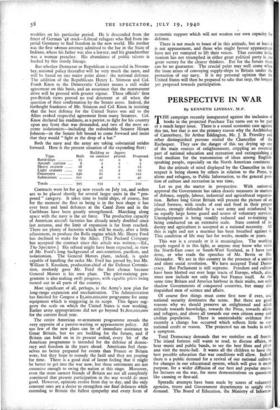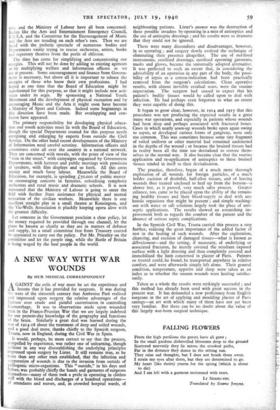PERSPECTIVE IN WAR
By KENNETH LINDSAY, M.P.
THE campaign recently inaugurated against the inclusion of books in the projected Purchase Tax turns out to be part of a much larger issue. There is a sound economic case against this tax, but that is not the primary reason why the Archbishop of Canterbury, Sir Arthur Eddington, Mr. J. B. Priestley and other distinguished persons visited the Chancellor of the Exchequer. They saw the danger of this tax drying up one of the main sources of enlightenment, crippling an essential part of national education and recreation and extinguishing vital medium for the transmission of ideas among English- speaking people, especially on the North American continent.
But the attitude of mind displayed by the Chancellor in this respect is being shown by others in relation to the Press, to aliens and refugees, to Public Information, to the general posi- tion of culture and recreation in war time,
Let us put the matter in perspective. With universa; approval the Government has taken drastic measures in matters of defence, supply, labour, industrial and agricultural organisa- tion. Before long Great Britain will present the picture of an island fortress, with stocks of coal and food in their proper places, strongly defended by a vast army and reinforced by an equally large home guard and scores of voluntary services. Unemployment is being steadily reduced and re-training is being conducted on an extensive scale. State control of in- dustry and agriculture is accepted as a national necessity. All this is right and not a murmur has been breathed against it. This condition of life may last for weeks, months or years.
This war is a crusade or it is meaningless. The working people regard it in this light, as anyone may know who visits the North-East coast or South-West Scotland, as I have just done, or who reads the speeches of Mr. Bevin or Mr. Alexander. We are in this country in the presence of a united and silent social revolution. We have accepted Total Demo. cracy. But Parliament is still supreme. Freedom and culture have been blotted out over large tracts of Europe, which, alas. must now include not only Italy but France itself. At the same time Britain and America harbour in their midst, not only shadow Governments of conquered countries, but many dis- tinguished men of science and affairs.
Of course first things must come first now if ever, and national security dominates the scene. But there are good reasons why we should preserve an enlightened and adult attitude towards knowledge, towards the Press, towards aliens and refugees, and above all towards our own citizen army and civilian population. There is unmistakable evidence that recently a change has occurred which reflects little to our national credit or reason. The projected tax on books is only a symptom.
Total Democracy demands that we mobilise on all fronts. The island fortress still wants to read, to discuss affairs, to hear music and public bands, to see the best films and plays and visit the music-hall. It wants all the children to have the best possible education that war conditions will allow. Indeed there is a public demand for a revival of our national culture. for changes in our educational system, which will give it more purpose, for a wider diffusion of our best and popular music, for lectures on the war, for more demonstrations on questions like canning or first-aid.
Sporadic attempts have been made by scores of voluntary agencies, trusts and Government departments to satisfy this demand. The Board of Education, the Ministry of Inforrro-
tion. and the Ministry of Labour have all been concerned. Bodies like the Arts and Entertainment Emergency Council, E.N.S.A. and the Committee for the Encouragement of Music and the Arts are treading on each other's toes. Thus we are faced with the pathetic spectacle of numerous bodies and Departments vainly trying to rescue orchestras, artists, books and repertory theatres from the perils of oblivion.
The time has come for simplifying and concentrating our energies. This will not be done by adding to existing agencies or by multiplying welfare and information officers as we are at present. Some encouragement and finance from Govern- ment is necessary, but above all it is important to release the energies of those who know their own professions. I had hoped at one time that the Board of Education might be transformed for this purpose, so that it might include new acti- vities under its aegis. By sponsoring a National Youth Movement and the development of physical recreation and by encouraging Music and the Arts it might soon have become a Ministry of Sport and Culture. Indeed some beginnings in this direction have been made. But overlapping and con- fusion have appeared.
The primary responsibility for developing physical educa- tion and youth activities must lie with the Board of Education, though the special Department created for this purpose needs energising and enlarging by experts from outside the Civil Service. On the other hand recent developments of the Ministry of Information need careful scrutiny. Information officers and committees exist all over the country in a national network. They are concerned with morale, with the point of view of the " man in the street," with campaigns organised by Government Departments, with lectures and public meetings with provision of speakers, with film displays and so forth. All this costs money and much fussy labour. Meanwhile the Board of Education, for example, is spending f5o,000 of public money on encouraging concerts in factories, subsidising symphony orchestras and rural music and dramatic schools. It is now rumoured that the Ministry of Labour is going to enter the field with further State assistance for physical and mental recreation of the civilian workers. Meanwhile there is one excellent straight play in a small theatre at Kensington, and the Vic-Wells Association is pluckily keeping opera alive with the greatest difficulty.
Let someone in the Government proclaim a clear policy, let the money required be provided through one channel, let the plans be known as clearly as they are in matters of defence and supply, let a small committee free from Treasury control be appointed to carry out the policy. Put Mr. Priestley on the committee and let the people sing, while the Battle of Britain is being waged by the best people in the world.



































 Previous page
Previous page